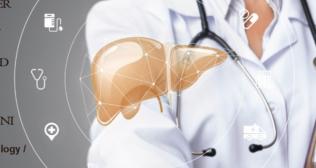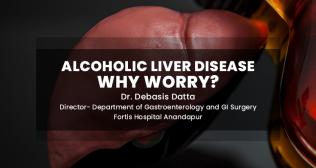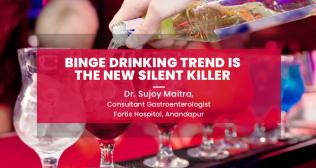
Gastroenterology and Hepatobiliary Sciences
Irritable Bowel Syndrome
Dr. Ajay Bhalla May 26, 2014

ROHIT is a senior executive in an MNC who leaves for office at 8:30 am everyday but to do so he has to get up at 6 am, not because he has to drop his kids to school or do one hour of gyming but because he takes a long time to 'get fresh'. Getting fresh refers to having a good bowel movement or the feeling of complete evacuation of stool which for him is achieved only after three to four visits to the loo and after the consumption of several cups of tea. If this exercise is unsuccessful the entire day doesn’t go well with 'gas, general irritability and discomfort.'
ANJALI who is a class XII student is preparing for the Medical entrance exam. Few days before every test she develops loose stools with increased frequency and pain in abdomen. Several courses of antibiotics and anti-amoebic medicines have not improved her symptoms. A large proportion of the population can identify with Rohit and Anjali who suffer from a disorder of 'intestinal motility' called Irritable Bowel Syndrome or IBS.
The diagnosis of IBS rests on making a positive clinical diagnosis on the history, which is characterised by the presence of:
1. Abdominal pain and discomfort
2. Constipation and bloating or visible abdominal distension
3. Other non-specific complains like dyspepsia, impaired sleep and headache, lethargy, etc.
IBS is recurrent abdominal pain or discomfort for at least three days/ month in last three months associated with:
• Improvement of the symptoms with defecation
• Onset associated with change in frequency or form of stools
Who is at Risk?
The following groups are at risk:
• Females
• Younger age
• Prolonged duration of diarrhoea following an attack of gastroenteritis
• Depression or adverse life events like childhood abuse.
IBS leads on to decrease in health related quality of life and increase in cost because of days lost at work, excess physician visits and cost of medication. Also it has been observed that patient with IBS are at risk of excessive abdominal surgeries (gall bladder, appendix, uterus, etc.)
What causes IBS?
No single cause but a combination of Physiological (Intestinal, Motility and Hypersensitivity), Psychosocial (Stress and Anxiety), Environmental and Genetic factors combine and result in this syndrome.
Although understanding what causes IBS is still in its infancy, one thing which all experts agree about is ‘Visceral Hypersensitivity’. This fancy term means that IBS sufferers have more sensitive intestines than healthy people and hence intestinal contractions that would not bothered most people are felt as pain by IBS patients. Also balloon distension in the rectum of IBS patient induces pain at much lower volume i.e. IBS patients perceive bloatedness or gas early.
Also, 50 – 90 per cent of IBS have associated anxiety especially in women between 20 – 30 years. It is important to point out that IBS is not self diagnosed because there are other serious conditions like Colon Cancer, Ulcerative Colitis, Celiac Disease, Endometriosis, etc which have similar symptoms and only a medical professional can distinguish this.
Also there are few alarm features (or red flags) that should make one extra cautious before diagnosing IBS. These are:
• Bleeding (Blood in stools)
• Anaemia
• Weight loss
• Onset of symptoms at old age
• Family history of malignancy
These red flags symptoms warrant prompt investigations.
Diagnosis of IBS is based on history, absence of red flag features and normal physical examination.
How to treat IBS?
IBS tends to be a life-long disorder which is not life threatening but life disturbing and irritating. A strong patient physician relationship is the key to best clinical care. A good physician should provide his patients education and support including an understandable explanation of why symptoms arise and enforces that this is neither a serious disease nor a psychosomatic disorder.
A continuing care strategy involves dietary and lifestyle modification, identifying trigger factors (new stress, infection) and their management and pharmacotherapy i.e. drugs. Fibre in diet is not helpful in relieving pain, diarrhoea and bloatedness but may benefit constipation. If fibre is to be supplemented, begin in low dosage and increase dose slowly to reduce excessive gas and distension. Lactose and fructose intolerance is common in IBS hence avoid milk and fruit juices. Gas producing food like legumes, leafy vegetable, nuts and dry fruits are to be avoided. Relief of pain with antispasmodic drugs and relief of gas and constipation with prokinetic drugs (increase intestinal motility) is advocated. Laxatives and anti-diarrhoeal drugs to be used sparingly.

 ROHIT is a senior executive in an MNC who leaves for office at 8:30 am everyday but to do so he has to get up at 6 am, not because he has to drop his kids to school or do one hour of gyming but because he takes a long time to 'get fresh'. Getting fresh refers to having a good bowel movement or the feeling of complete evacuation of stool which for him is achieved only after three to four visits to the loo and after the consumption of several cups of tea. If this exercise is unsuccessful the entire day doesn’t go well with 'gas, general irritability and discomfort.'
ROHIT is a senior executive in an MNC who leaves for office at 8:30 am everyday but to do so he has to get up at 6 am, not because he has to drop his kids to school or do one hour of gyming but because he takes a long time to 'get fresh'. Getting fresh refers to having a good bowel movement or the feeling of complete evacuation of stool which for him is achieved only after three to four visits to the loo and after the consumption of several cups of tea. If this exercise is unsuccessful the entire day doesn’t go well with 'gas, general irritability and discomfort.'
28 Years
1600















